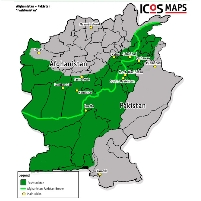Does the Obama Administration Need a Lesson in Afghan History?
Friday, May 08, 2009
 Pashtunistan (icos maps)
Pashtunistan (icos maps)
Sometimes it pays to study a bit of history before sending troops to a foreign land. The Bush administration learned this the hard way when they invaded Iraq without taking into account the fact that Sunnis and Shiites in Iraq had been in conflict since before Saddam Hussein was even born. Now it is the turn of the Obama administration to ignore history at its peril as it prepares to send more troops to Afghanistan, while calling upon the leaders of that country and Pakistan to do a better job of controlling their common border.
That’s because, since long before Al-Qaeda and the Taliban were even created, Afghans have not agreed to the version of their borders that Pakistan and the West take for granted.
When the U.S. administration urges the Afghan and Pakistani administrations to crack down on border control, it ignores the fact that this border has been a problem spot for more than a century. The border between Pakistan and Afghanistan was drawn in 1893 by Sir Henry Mortimer Durand, a British colonial officer who was called upon to determine the extent of British India. The “Durand Line,” however, did not fall between two distinct regions; it went through Pashtunistan, a territory the British could never quite conquer. This is the land of the Pashtuns, who are often called a tribe but are better termed a nation because they number about 40 million. The Pashtuns never respected the Durand Line, since it was drawn by foreign powers, without regard for their own wishes.
After the partitioning of India in 1947, Afghan officials found even less reason to respect the Durand Line because they saw Pakistan as a new nation, no longer a part of British India, and thus the agreements with British India seemed null and void. This attitude has survived to the present-day control of the Afghan-Pakistani border, and will not easily be alleviated by U.S. influence. Even Hamid Karzai, Afghan president and a Pashtun himself, is reluctant to impose too strict regulation, possibly because of his own cultural ties to Pashtunistan.
-Emma Nagy, David Wallechinsky
Pakistan’s British-Drawn Borders (by Robert Mackey, New York Times)
- Top Stories
- Unusual News
- Where is the Money Going?
- Controversies
- U.S. and the World
- Appointments and Resignations
- Latest News
- Musk and Trump Fire Members of Congress
- Trump Calls for Violent Street Demonstrations Against Himself
- Trump Changes Name of Republican Party
- The 2024 Election By the Numbers
- Bashar al-Assad—The Fall of a Rabid AntiSemite






Comments